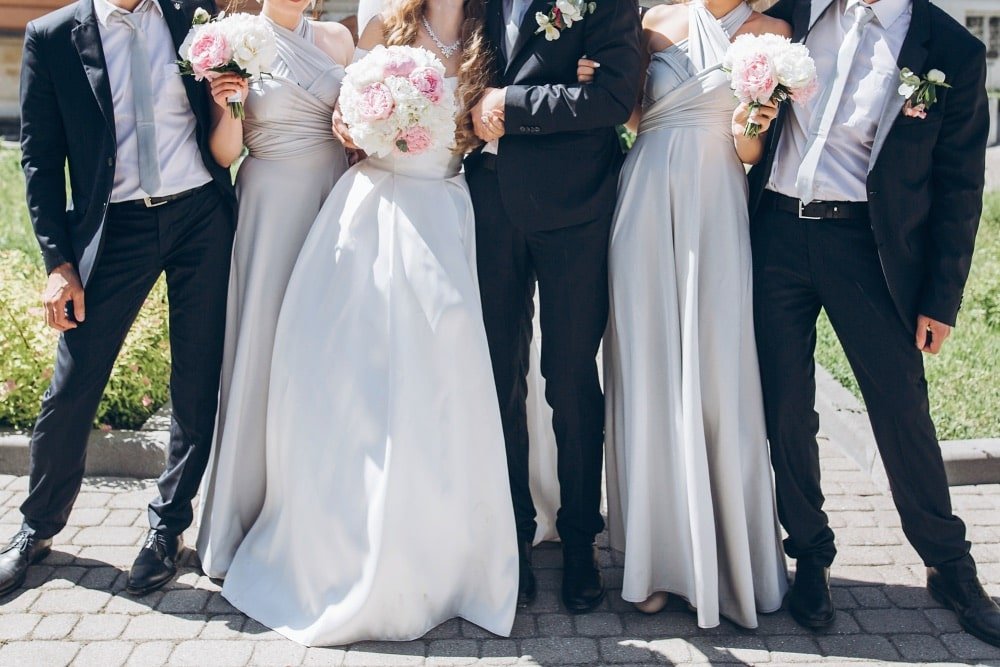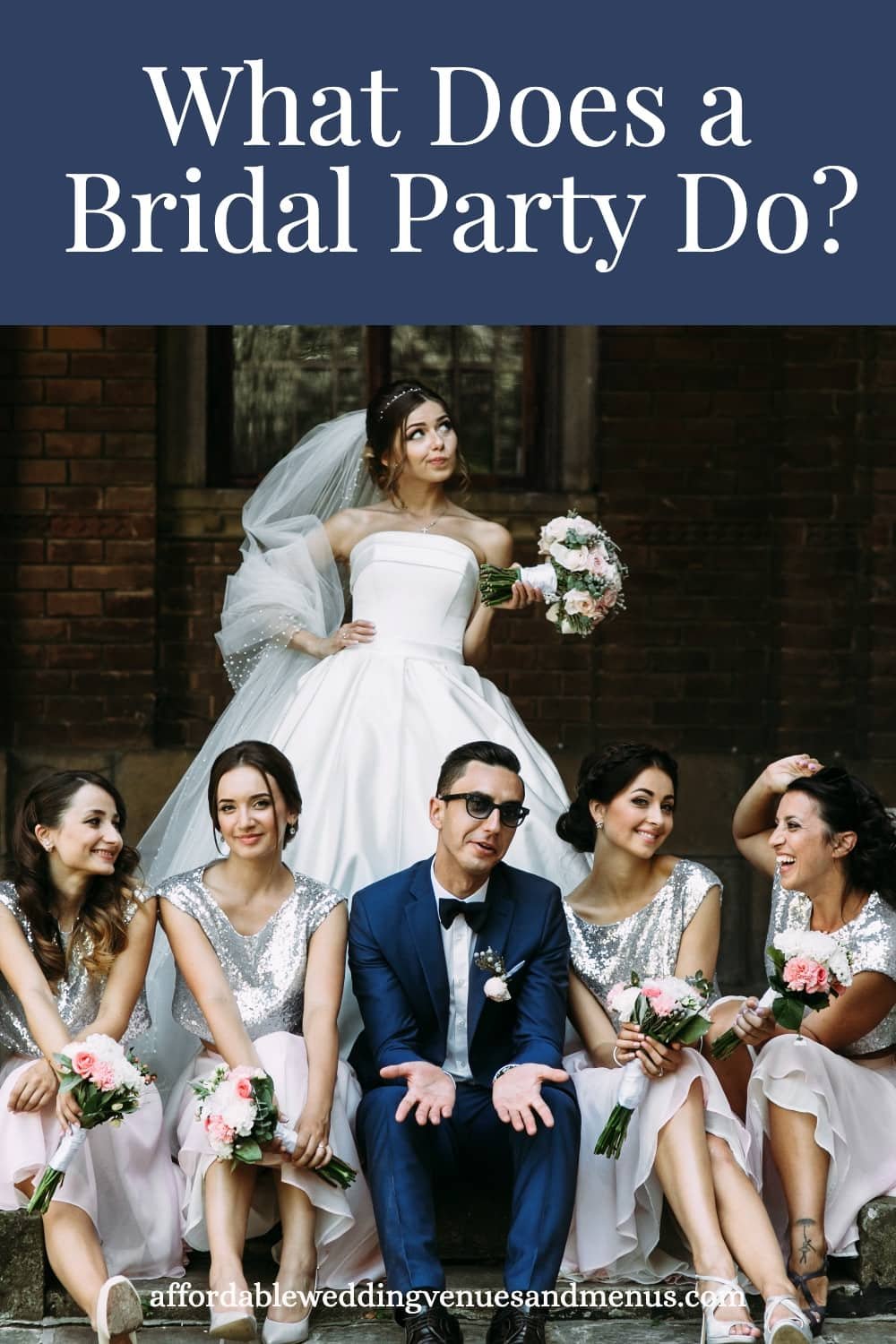What Does a Bridal Party Do?
A bridal party with gray bridesmaid dresses and peony bouquets.
When you start planning a wedding, one of the first things you’ll do is ask your friends to be in your bridal party. You might already know who’s going to do what. But if you haven’t been in a wedding before, you might be wondering: What does a bridal party do?
Please note: this article contains affiliate links. That means that I may earn a commission if you decide to buy something.
The most important duty of a bridal party is to be positive and supportive for the couple. Ideally, they’ll provide emotional support leading up to, and on the wedding day itself.
As well as being supportive, members of the bridal party will have some practical duties. Some roles will require planning and participating in events like wedding showers, bachelor or bachelorette parties, and the wedding ceremony and reception.
Role of the Bridesmaids
The bridesmaids are usually close friends and family of the bride. The main responsibilities of the bridesmaids and maid of honor are to support the bride and help her on her wedding day.
They’ll also plan and help pay for pre wedding parties, including the bridal shower and bachelorette party. On the wedding day they’ll walk up the aisle, join in photo sessions and take part in the wedding reception dances or activities.
Role of Maid of Honor or Matron of Honor
The maid of honor or matron of honor is the person closest to the bride. She’ll perform the regular bridesmaid duties as well as a few extra ones. Most often the maid of honor will take the lead in planning pre wedding events. On the day of the wedding, the maid of honor will help the bride with her bouquet, her dress and her train.
Role of the Groomsmen
The groomsmen are the close friends and family of the groom. The main responsibilities of the groomsmen and the best man are to support and help the groom.
They’ll take part in the pre wedding events, including fittings and the bachelor party. If the couple has planned coed wedding showers or parties, the groomsmen will join in those, as well.
On the day of the wedding, the groomsmen will walk in the procession and stand with the groom at the altar. They’ll join in photo sessions, grand entrances and reception dances afterwards.
Role of the Best Man
The best man will perform the same duties as the groomsmen, plus he’ll take the lead for some events. The best man is in charge of planning the bachelor party. He’s also responsible for bringing the rings and making a speech at the reception.
Ceremony Ushers
Depending on how many guests you’re inviting, you might need to ask some friends to be ushers. Ushers will welcome guests, hand out programs and help the guests find seats.
If you’ve got a smaller guest list, you can ask your bridesmaids or groomsmen to greet the guests. If your guest list is bigger, it’s best to ask other people to act as ushers.
Flower Girl Duties
Flower girls are an optional role in your bridal party. A flower girl is usually aged 3 to 8. They’ll walk down the aisle and scatter flower petals ahead of the bride. If you have a young sibling, niece or daughter they can be adorable flower girls.
If you don’t want to be traditional, a flower girl doesn’t have to be a girl. She can be any age or gender. You can even dress up your dog in a flower collar and let them do the honor.
Ring Bearer Duties
Ring bearers are totally optional, but can be a very cute addition to your wedding party. They’re typically aged 3 to 8, but as long as they can handle getting down the aisle, any age is fine.
The main job of the ring bearer is to deliver the rings to the officiant at the front of the church. The ring bearer usually carries the rings on a pillow or dish and walks up the aisle just before the flower girl.
Mother of the Bride
Traditionally, the mother of the bride will spend the day getting ready in the bridal suite. When it’s time for the ceremony, she’ll be escorted up the aisle by the best man or a groomsman.
The mother of the bride usually contributes to the wedding expenses and helps with the planning. The mother of the bride will also be in charge of her portion of the guest list.
If you’re older, or not close with your mother, you might decide to plan and pay for the wedding yourselves.
More modern roles for the bride’s parents can include both their mother and father in any of the pre wedding or wedding day events. If you have a close relationship with one or both of your parents, they can be part of any event you wish.
Hosting an engagement party.
Trying on wedding dresses.
Hosting a bridal shower.
Father of the Bride
Traditionally the father of the bride would pay for the wedding, then walk her up the aisle. Most weddings nowadays are paid for by a combination of people. And the father can take part in any wedding planning that the couple asks him to. He may be invited to venue tours, menu tastings or even to a dress fitting, as well as his traditional duties:
Walk the bride up the aisle.
Give a speech at the reception.
Do a Father and Daughter dance.
Who Gives Away the Bride?
Most brides don’t want to be “given away” - it’s an outdated and sexist tradition. Most people choose to be escorted up the aisle instead. Being chosen as an escort for the bride is a special honor.
If you have a good relationship with your father, walking down the aisle with him can be an important and emotional moment for both of you.
Many modern brides choose to walk themselves, walk with their spouse to be, or another loved one. If your father isn’t walking down the aisle with you, he could go ahead as an escort for your mother. If relationships are complicated, he could be seated ahead of time, with the rest of the guests.
Mother of the Groom
Traditionally the mother of the groom would plan and host the rehearsal dinner, plus pay for certain items in the wedding. Nowadays, most couples make an overall budget that includes everything. Depending on your family and your finances, you may decide to stick with tradition. Or you can plan and pay for the rehearsal yourselves.
If you’ve got a close relationship with your groom’s mother, you can invite her to any pre wedding events that you’d like.
At the wedding ceremony, she’ll walk up the aisle with the father of the groom. At the wedding reception, she can join in a Mother and Son dance, if the couple has planned one.
Father of the Groom
In the past, the father of the groom was responsible for certain payments. Nowadays, most couples and their families will all contribute, based on their abilities. The father of the groom can help co-host the wedding and any other pre wedding parties or events.
He can also be a great emotional support for his son, leading up to, and on the wedding day itself. At the ceremony, he’ll walk up the aisle with the mother of the groom. Then at the reception, he might be asked to make a speech or take part in a special dance.
Role of the Officiant
The officiant performs the ceremony on the day of the wedding. They’ll make sure all the legal aspects are taken care of. The officiant will file the marriage license after the ceremony. If you’ve chosen a religious officiant, they might also offer you pre marriage counseling or classes.
A bridal party with red accents, at an outdoor photo session.
Other Bridal Party Roles
A Christian ceremony might include candle lighters. These are usually younger people who will light the aisle candles ahead of the bride.
A Jewish wedding is held underneath a chuppah, or a canopy. The bridal party might include chuppah carriers, who’ll hold it up for the ceremony.
Many traditional weddings also include readers. They might read a religious text, inspirational literature or poetry during the ceremony.
A Greek Orthodox wedding includes wedding sponsors. They’ll provide a silver tray for the couples crowns and rings during the ceremony.
Bridal Party vs Wedding Party
Traditionally, the term bridal party meant the attendants on the bride’s side. The term wedding party was used to refer to the attendants on the groom’s side.
Most modern parties use the terms interchangeably. The gender of the parties and their assignments don’t matter. You can call your group of friends and attendants either a bridal party or a wedding party - they both mean the same thing.
Does the Bridal Party Do DIY?
It depends on your friend group and the style of your wedding. If you’re having a casual wedding with lots of DIY, you can definitely ask your wedding party to help. If you’re planning a more formal or traditional wedding, it’s best to hire professionals.
For all types of weddings, lots of brides like to do crafts, like invitations or centerpieces. If your friends are into it, you can plan a fun day of DIY projects for your wedding. Lots of bridesmaids are happy to help with things like addressing invitations or making favors.
When you’re deciding if you should ask for DIY, consider the timing, and the size of the chore:
Asking a groomsman to pick up flowers is fine. Asking a groomsman to move 100 chairs while he’s wearing a suit is not fine.
Asking a bridesmaid to help you tie bouquets is fine. Asking a bridesmaid to decorate a hall, in between the ceremony and reception is not fine.
Can You Have an Uneven Bridal Party?
Most couples choose the same number of bridesmaids and groomsmen. But if you’ve got VIPs that you absolutely want to include, it’s ok to have an uneven number.
With an uneven number, try to keep the difference small. If one side has 10 and the other only has a single friend it could make them feel awkward. Two or three extra on either side is fine, as long as you’re both happy.
If you’ve got a lot more friends on one side, you can ask them to perform other roles instead. Other roles could be ceremony readers, ushers or chuppah holders, for a Jewish ceremony.
Can You Have a Mixed Gender Bridal Party?
Mixed gender bridal parties are becoming more popular. Lots of couples have friends who are the opposite gender or non binary. Plus, lots of people want to include their siblings.
If you and your brother are best friends, you could choose a man of honor instead of a maid of honor. Or bridesmen instead of bridesmaids. The same for the groom: he could choose a best woman or a groomswoman to fulfill the same roles.
Pin this article to save it for later:







